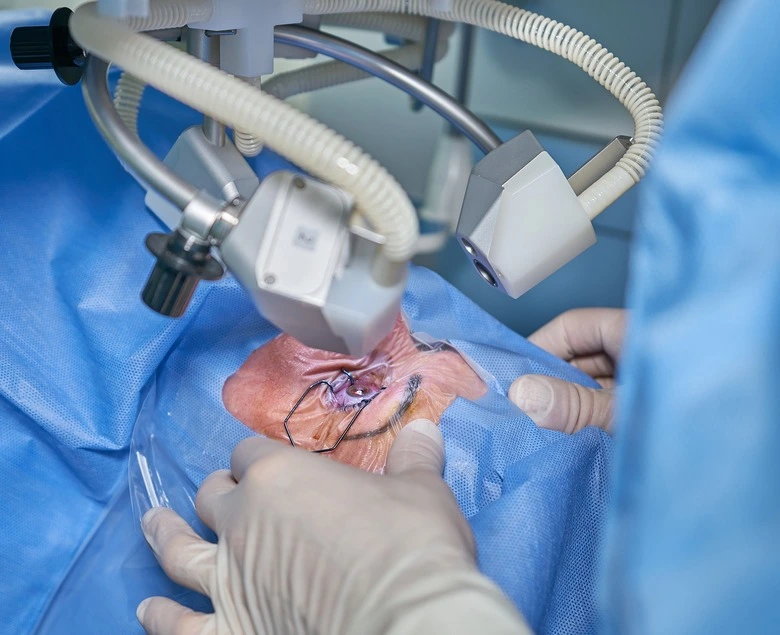Table of Contents
Introduction
Laser eye surgery is a procedure that has been growing in popularity in recent years. It is a surgical technique that uses a laser to reshape the cornea of the eye, with the goal of improving vision. Laser eye surgery can be used to treat a variety of eye conditions, such as myopia (nearsightedness), hyperopia (farsightedness), and astigmatism. However, before deciding whether or not to undergo laser eye surgery, it’s important to understand the procedure, the risks and benefits, and what to expect before, during, and after the surgery.

The Procedure
Laser eye surgery is typically performed as an outpatient procedure, which means that the patient can go home the same day. Before the surgery, the patient will receive numbing eye drops to minimize any discomfort. The surgeon will then use a laser to reshape the cornea of the eye. The specific type of laser used will depend on the type of correction needed.
LASIK (Laser-Assisted in Situ Keratomileusis) is a frequently performed form of laser eye surgery. During LASIK, the surgeon creates a thin flap on the surface of the cornea using a microkeratome or a femtosecond laser. After that, the flap is lifted, and the underlying cornea is reshaped using an excimer laser. The flap is then replaced, and the eye is allowed to heal on its own.
PRK (Photorefractive Keratectomy) is another type of laser eye surgery. During PRK, the surgeon removes the outer layer of the cornea and then uses an excimer laser to reshape the cornea. The cornea’s outer layer then recovers over time.
The Risks and Benefits
Laser eye surgery, like any surgical procedure, has some risks. Some of the most common risks include dry eyes, glare, halos, and double vision. In rare cases, the cornea can become infected, and vision can be permanently damaged.
However, there are also many benefits to laser eye surgery. Most patients experience improved vision and a reduced need for glasses or contact lenses. Many patients also find that the procedure is relatively painless and that they can return to their normal activities within a few days.
It’s important to note that not everyone is a good candidate for laser eye surgery. People with certain eye conditions, such as cataracts, glaucoma, and severe dry eye, may not be able to undergo the procedure. Additionally, the success of the procedure can depend on factors such as age, prescription strength, and overall eye health.
Before the Surgery
Before undergoing laser eye surgery, it’s important to find a qualified surgeon who has experience with the specific type of surgery you will be having. The surgeon should also be able to provide you with a detailed explanation of the risks and benefits of the procedure, as well as what to expect before, during, and after the surgery.
You will also need to have a comprehensive eye exam to determine if you are a good candidate for the procedure. The exam will include tests to measure your prescription strength, corneal thickness, and overall eye health.
In the weeks leading up to the surgery, you should avoid wearing contact lenses and avoid using certain medications, such as those that can increase the risk of bleeding. You should also arrange for someone to drive you home after the surgery, as you may not be able to drive yourself.
During the Surgery
During the surgery, you will be awake, but you will receive numbing eye drops to minimize any discomfort. The surgery typically takes less than 30 minutes, and most patients are able to go home the same day.
After the Surgery
After the surgery, you will need to rest for a few hours. You may experience some discomfort, such as dryness or a sensation of grittiness in the eyes, but this should improve over time. You will need to use eye drops to help prevent infection and to keep your eyes moist.
You should also avoid rubbing your eyes and engaging in any activities that could put pressure on your eyes, such as swimming or playing contact sports. It’s also important to avoid wearing eye makeup for a few weeks after the surgery.
You will need to attend follow-up appointments with your surgeon to ensure that your eyes are healing properly. Your vision may be blurry or hazy for a few days or weeks after the surgery, but most patients experience improved vision within a few days.
It’s important to remember that the healing process can vary from person to person, and it may take several months for your vision to fully stabilize. You may also need to wear glasses or contact lenses for certain activities, such as reading or driving at night.
In conclusion, laser eye surgery can be an effective way to improve vision and reduce the need for glasses or contact lenses. However, it’s important to carefully consider the risks and benefits of the procedure, and to find a qualified surgeon who can provide you with detailed information about what to expect before, during, and after the surgery.
If you are considering laser eye surgery, be sure to have a comprehensive eye exam and to discuss your options with your eye doctor. With the right preparation and care, laser eye surgery can be a safe and effective way to improve your vision and quality of life.











Leave a Reply